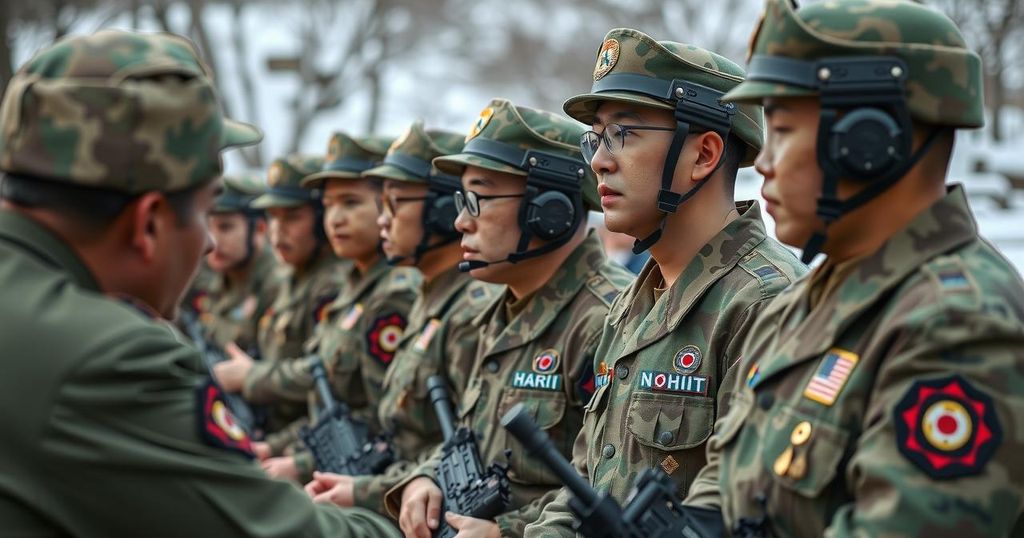Former North Korean Soldiers Assess Troops Fighting in Russia’s War Against Ukraine
The article examines the experiences of former North Korean soldiers and their insights into troops deployed in Ukraine. It notes that around 11,000 North Korean soldiers, primarily from the elite Storm Corps, are assisting Russian forces but face challenges such as malnutrition and inadequate training. While these troops demonstrate loyalty and combat potential, the article warns against underestimating their impact, given the harsh realities of their military training and the ideological conditioning they endure.
Former North Korean soldiers have shared harrowing details of their military experiences, including extreme hunger and malnutrition, while highlighting the potential conditions of North Korean troops now assisting Russian forces in Ukraine. Reports indicate that approximately 11,000 North Korean troops have been deployed to aid Russia in reclaiming territory lost to Ukraine. South Korean officials have noted that these soldiers may already have incurred casualties, despite their high morale and elite status as members of the Storm Corps, a unit known for selecting only the fittest individuals. However, defectors caution that these soldiers, while loyal and ideologically driven, lack contemporary combat training and have suffered from severe dietary deficiencies, causing concerns over their operational effectiveness in Ukraine.
Defectors like Haneul recounted their struggles in the North Korean military, emphasizing the lack of sustenance which contributed to their decision to defect. Training appears to have become increasingly difficult over the years, with soldiers facing chronic malnutrition and limited resources. Furthermore, they have expressed doubts about their ability to adapt to a different combat environment, illustrating concerns about their functionality beyond the mountainous terrains of North Korea. While the Storm Corps is tasked with infiltration roles, the command structure and communication challenges have also raised eyebrows regarding their deployment in Ukraine.
Experts highlight the highly ideological conditioning of these troops, which renders them exceptionally obedient to North Korean leadership. Despite the harsh realities of their military lives, many soldiers may view this as an opportunity for advancement or an adventure beyond their constrained existence. There is ongoing speculation that the North Korean regime could bolster troop numbers, with estimates suggesting that up to 100,000 soldiers could be sent to augment military efforts if needed. Therefore, experts stress the importance of not underestimating these soldiers, given their commitment and potential for acclimatization on the battlefield.
The reluctance of troops to defect remains strong, given the severe consequences associated with surrender, including the culture of valuing death over capture. Strategies such as electronic or psychological operations are being explored to encourage defection, yet success remains uncertain. The profound mental conditioning and loyalty instilled during their service pose significant challenges for Ukrainian and South Korean efforts to demoralize these North Korean fighters.
Conclusively, while the deployment of these troops may not currently alter the overall dynamics of the conflict, their psychological resilience and loyalty to the regime could make them a formidable force in the battlefield, thus necessitating a meticulous strategic approach from opposing factions.
The article discusses the experiences of North Korean defectors and their insights on the deployment of North Korean troops in the conflict in Ukraine amidst Russian military efforts. Highlighting the struggles faced by North Korean soldiers, particularly regarding malnutrition, extreme training conditions, and ideological indoctrination, the narrative explores how these factors influence their participation in foreign conflicts. Furthermore, the piece addresses concerns regarding their adaptability and combat effectiveness on unfamiliar terrain, which contrasts sharply with their rigorous training in the mountainous landscape of North Korea. The background also provides a context for understanding the conditions under which these soldiers operate and their motivations, highlighting the complex dynamics at play in international military relations.
In summary, the deployment of North Korean troops to assist Russian forces in Ukraine raises questions about both their combat effectiveness and psychological resilience. Defectors emphasize that despite severe malnutrition and training limitations, the soldiers’ loyalty and ideological commitment to Kim Jong Un render them a considerable force on the battlefield. The societal pressures to adhere to military expectations complicate the likelihood of defections, even amid potential dissatisfaction with their conditions. Therefore, while they may face numerous challenges in adapting to new combat paradigms, their numbers and dedication could still pose significant challenges for opposing forces.
Original Source: www.bbc.com




Post Comment